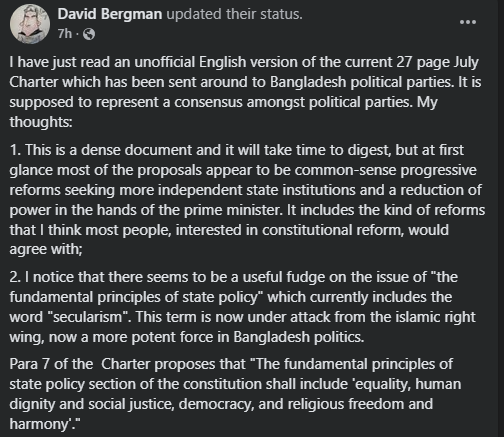British journalist David Bergman has said the parties that agreed to the July Charter lack democratic legitimacy, as some of them have never been tested in inclusive and fair elections, while others have never even vied for the polls.
Bergman observed that although the 27-page document outlines reform proposals such as curbing executive powers and strengthening state institutions, its claim to represent the will of the people is misleading.
He argued that many of the signatories have never formed a government through the ballot, which undermines their authority to propose such a sweeping political framework.

He further noted that the charter seems to position itself above the country’s Constitution by presenting itself as the supreme embodiment of the people’s will. According to him, this not only raises questions of legality but also erodes democratic accountability.
While supporters describe the July Charter as a necessary roadmap for reform, critics insist that any meaningful transformation must be rooted in electoral legitimacy rather than agreements among unelected or untested political actors.
Bergman`s full status
I have just read an unofficial English version of the current 27 page July Charter which has been sent around to Bangladesh political parties. It is supposed to represent a consensus amongst political parties. My thoughts:
1. This is a dense document and it will take time to digest, but at first glance most of the proposals appear to be common-sense progressive reforms seeking more independent state institutions and a reduction of power in the hands of the prime minister. It includes the kind of reforms that I think most people, interested in constitutional reform, would agree with;
2. I notice that there seems to be a useful fudge on the issue of "the fundamental principles of state policy" which currently includes the word "secularism". This term is now under attack from the islamic right wing, now a more potent force in Bangladesh politics.
Para 7 of the Charter proposes that "The fundamental principles of state policy section of the constitution shall include `equality, human dignity and social justice, democracy, and religious freedom and harmony`."
My reading of this provision is that it does not suggest a "repeal" of the section (though some may argue that this is inferred) only that this new wording should be "included". If my reading is correct, this allows the argument about the retention of the word "secularism" to be decided in the future, under an elected government. This would be a good thing.
3. Although the creation of a second chamber is intended to act as a check on the power of the prime minister etc, and any new government, and it may do just this, it remains unclear how this will play itself out. There is a real question whether the answer to Bangladesh problems includes the need for even more politicians!
4. In the final section, there appears to be an attempt to make this document supreme, usurping even the current constitution.
This is justified in a rather convoluted manner by saying (a) the people are the owners of the state (b) in a democratic system, the will of the people is reflected and established through political parties. and (c) the `July National Charter 2025` as something agreed by political political parties is therefore "a clear and supreme expression of the people`s will through long discussions."
This charter may include some positive reforms, which may have received consensus from the political parties, and hopefully this will result in some or most of these reforms happening in the future - but, please, don`t pretend that this process is anything more than this.
The idea that anything agreed by a group of current highly undemocratic political parties, many of them very small, who have not been put to the test in a free and fair election since 2008, or indeed have never taken part in any national election, represents "a clear and supreme expression of the people`s will", is simply laughable. And the idea that this Charter should usurp the constitution is wrong.
5. Although the introductory language to the Charter is far more restrained and less partisan than the the July Declaration (announced some days ago - see previous posts), I do however have two further criticisms of wording in the Charter text.
First, it says that "more than one thousand four hundred unarmed citizens ... were killed". Where does this figure come from? The government`s DGHS has a confirmed list of around 850 killed - though some of those listed were not killed by law enforcement/Awami League. Whilst 850 is, I agree, not the definitive number and there may between another 50-100 deaths that will need to be added, the figure is most likely to end up somewhere between 900 to 1000 rather "more than 1400"
So why put say that?
The UN Fact Finding report does not even state "more than 1400". It stated that "that as many as" 1,400 people could have been killed during the protests". Moreover, this 1400 includes 52 law enforcement officers as well as over 100 alleged (unconfirmed) killings due to recriminatory violence against Awami League activists etc.
One of the positive things about the recent July Declaration was that it did not exaggerate the numbers of those who died, saying that "nearly one thousand" were killed
The Charter should be amended so that in relation to the number of killings in July/August, it is consistent with the wording in the Declaration.
As to whether "more than twenty thousand people were injured" as the Charter says, I cannot say. But the Charter should only use figures for the injured that are consistent with the official DGHS figures.
Secondly, in the Background section, in referring to the Awami League period, 2009-2024, the Charter states this:
"They usurped the democratic and human rights of political opponents and critics, and through state-sponsored disappearances, killings, oppression-torture, lawsuits, and attacks, they established a reign of anarchy, terror, and fear. The BDR massacre at Pilkhana in 2009 and the killings at Shapla Chattar in Motijheel in 2013 are among the prime examples."
Whilst I do think that claiming that the Awami League established "a reign of anarchy, terror, and fear" is exaggerated and that toned-down wording should be used, my concern here is not so much with that, but with the inclusion of the "The BDR massacre at Pilkhana in 2009".
How is that event included in Awami League`s "reign of anarchy, terror, and fear."? I understand that there is speculation that somehow the AL government conspired to decapitate the army though the killing of the army officers, there is however, right now, no substantive evidence to support this contention. So how can the Charter include the BDR massacre in its list of state atrocities?
There is clear demonstrable evidence of the "state-sponsored disappearances, killings, oppression-torture, lawsuits, and attacks" which the Charter mentions. So why spoil it by including the BDR massacre at Pilkhana in 2009, where at present the most the government can be accused of is mis-management rather than deliberate killing.

















-20260221022942.jpg)
-20260221022827.webp)















